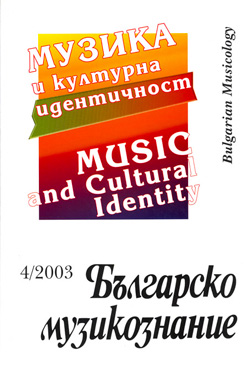Ромфест - конструиране на идентичност чрез музика (Върху ромски гледни точки към един ромски музикален фестивал)
Romfest - Constructing Identity through Music
Author(s): Lozanka PeychevaSubject(s): Music
Published by: Институт за изследване на изкуствата, Българска академия на науките
Summary/Abstract: The Roms’ culture identity is a challenge for researchers, because the Roms, being a disperse ethnic group, are culturally heterogeneous, in constant contact with the majority they live with. Their today’s cultural politics is produced more not by state or economical institutions but by non-governmental organizations including unions of the Roms themselves. The challenge is a research of their attitude towards their own music as a symbol of group ethno identity -not only because of the so usually found practice of somebody else speaking on their behalf, but more because their music is a dominant part of the expression of their cultural identity. The National Festival for Roms’ music and dances with international participation has a ten-year history. When in 1993, the Festival for Roms’ music and songs in Stara Zagora takes place for the first time, the Roms’ music is to a great extent unknown and unacknowledged by the Bulgarian public. Organized by a group of Roms’ socially active persons, musicians, politicians, leaders, Romfest has been looking through the years for collaboration with different local, national, state and non-state organizations. Romfest strengthens it’s position as an institution, which creates and establishes today’s Roms’ music and it’s faces in Bulgaria. After being acknowledged by the jury and the public after a performance in the Fest’s stage such performers as Sofi Marinova, Gypsy Aver, Stilian, Crystali, Karandila have become stars of the media music in Bulgaria. The event called Romfest has a circle of initiators, ideologists, operatively carrying out the ideas, people of art, public -with a few words, the people who make the Fest what it is. One of the groups can be conditionally called group of ideologists. It is compounded of a large part of the members of the Organizing Committee, Roms’ political, public leaders, activists from the non-state sector. According to them the main contribution of Romfest is that it establishes “the unique Roms’ culture waving it into the texture of the Bulgarian culture”. According to the ideologists the Roms’ music is more valuable as an expression of the Roms’ culture, which is a base for indicating important social and political positions, than in its musical aspects. The group conditionally called the practicians has another attitude towards the music. This group is compounded of the immediate organizers of the fest, mainly people living in Stara Zagora. The Roms’ music is accepted as type of business and the Fest itself, as an investment in a future music industry or a resource for powerful position in the political campaigns. The practicians similarly to the ideologist are not so interested in the music itself but in the abilities it gives for contact with the people who listen to it and with the political and business elites. A third group called the specialists also has some kind of attitude towards the Fest. It is compounded of popular Rom musicians, most of whom are part
Journal: Българско музикознание
- Issue Year: 2003
- Issue No: 4
- Page Range: 161-171
- Page Count: 11
- Content File-PDF

